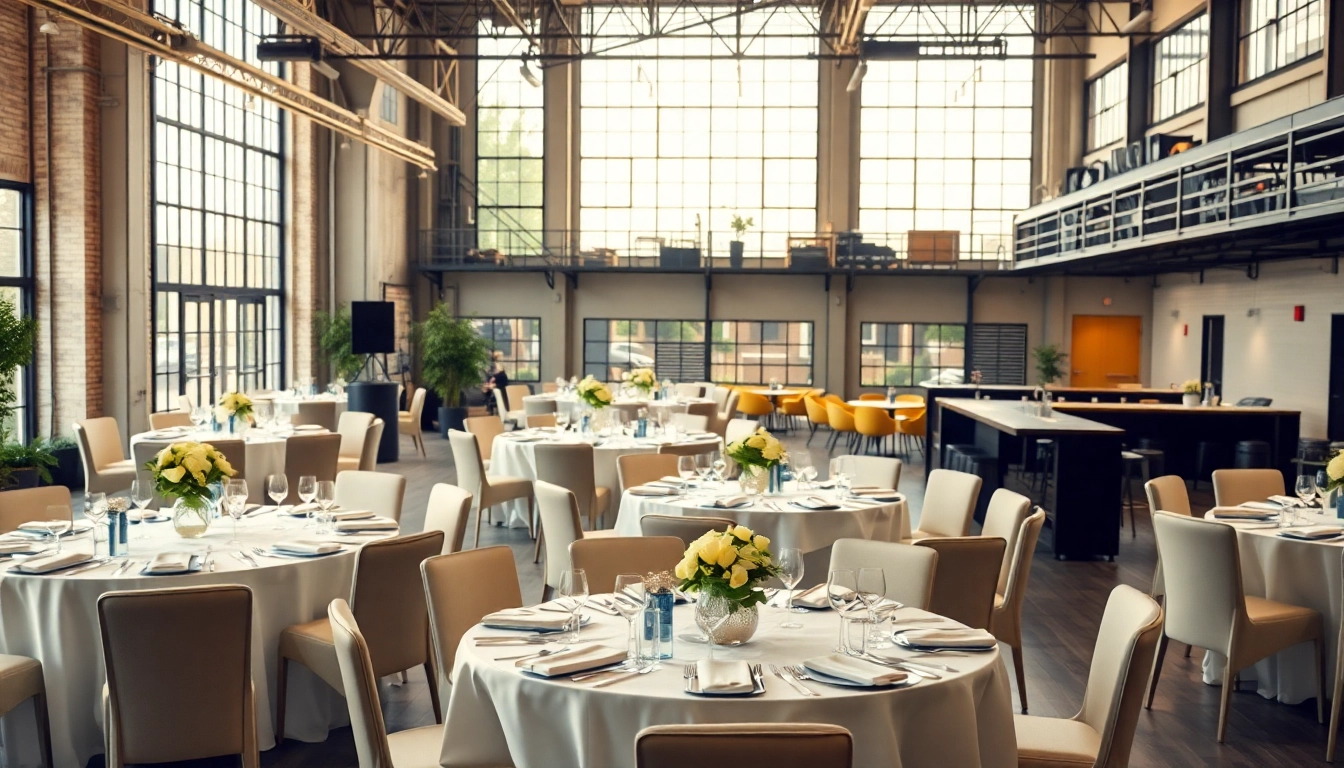Understanding Your Event Space Needs
Choosing the right event space is a critical step in ensuring the success of any event, whether it’s a corporate meeting, a wedding, or a community gathering. The process begins with a clear understanding of your specific needs. By effectively defining the purpose of the event, determining required attendance and capacity, and assessing technical requirements, event planners and organizers can make informed decisions that lead to memorable experiences.
Defining the Purpose of the Event Space
The first step in selecting an event space is to clearly define the purpose of your event. Different types of events have unique requirements and expectations. For instance, a product launch may necessitate a modern space that embodies the brand’s image, while a wedding may prefer a romantic setting with numerous aesthetic details. Identifying the core purpose—be it for professional meetings, social gatherings, or entertainment—will guide your choice of venue features, layout, and ambiance.
Identifying Attendance and Capacity Requirements
Understanding the expected number of attendees is essential when choosing an event space. Not only does this affect the size of the venue, but it influences layout choices, seating arrangements, and even catering logistics. When planning, consider potential last-minute additions or cancellations to ensure the chosen space accommodates all guests comfortably. A venue’s capacity typically indicates a maximum number of attendees but be wary of exceeding that limit as it could compromise safety and comfort.
Assessing Technical and Equipment Needs
Your event may require specific technical setups, such as audiovisual equipment, lighting, or Wi-Fi access. Assessing these needs beforehand ensures that the venue can adequately fulfill them. Different events have varying levels of technical requirements; for example, a conference may need projectors and microphones, while a wedding might focus more on aesthetics with minimal tech involvement. Before signing any contracts, confirm with the venue about available equipment and any additional costs that may be incurred for setup or rentals.
Essential Features of a Great Event Space
Not all event spaces are created equal. Identifying the essential features that contribute to a memorable experience can set one venue apart from another. Essential factors include layout and design, ambiance, and location accessibility, which are all critical to an event’s overall success.
Layout and Design for Functionality
The layout of an event space significantly influences how well the event functions. A flexible floor plan allows for seating arrangements that cater to activities like networking, dining, or presentations. Consideration should also be given to natural flow; it’s paramount that attendees can easily navigate the space without bottlenecks. Therefore, venues offering modular layouts that can adjust to different needs can be particularly advantageous.
Ambiance and Atmosphere Considerations
The ambiance of an event space can greatly enhance the experience for attendees. Factors such as lighting, decor, and even the smell can evoke specific feelings and set the tone. A corporate launch might benefit from a sleek, modern look with appropriate lighting, while a wedding might call for softer hues and romantic decor. When visiting potential venues, be sensitive to how each space makes you feel and consider how that aligns with your vision for the event.
Accessibility and Location Benefits
Choosing an accessible location is key for maximizing attendance at your event. Consider proximity to public transport, parking availability, and compliance with accessibility standards for differently-abled individuals. An easily accessible venue can significantly increase the number of participants willing to attend—as convenience often trumps many other attractive features. Additionally, consider the surrounding area; nearby hotels and restaurants might enhance the experience for out-of-town attendees.
Budgeting for Your Event Space
Creating a budget for your event can be daunting, especially as costs can quickly accumulate. It’s crucial to break down rental costs, identify any hidden fees, and evaluate the value-added services offered by venues to ensure your budget is well-managed and utilized effectively.
Breaking Down Rental Costs
When budgeting, begin by outlining all possible rental costs associated with the event space. These can include basic rental fees, service charges, security deposits, and costs related to additional services like cleaning and setup. Additionally, consider any hourly restrictions, overtime fees, and the minimum time required for booking the venue, as these aspects can impact your overall budget. It’s often helpful to get a detailed quote from the venue to understand what is included in the rental agreement.
Hidden Fees to Watch Out For
Hidden fees can significantly impact your overall budget if they are not identified upfront. Common hidden costs include charges for additional power sources, sound equipment, staff for setup or cleanup, parking fees, and even gratuities for staff. Always ask for a comprehensive list of fees when negotiating with venues, and ensure that you understand the terms of the contract completely. Also, reviewing the contract with a careful eye can avert unexpected financial burdens later on.
Value-Added Services Offered
Some venues provide additional services that can enhance the experience while potentially saving costs. These services may include event planning assistance, catering options, audio-visual support, and even marketing services. Value-added services can minimize hassle and ensure the event runs smoothly, as the venue personnel usually has extensive experience with the space. When comparing venues, factor in these additional services before finalizing your choice, as they could be beneficial to your planning process.
Preparing the Event Space for Success
Once an event space is chosen and the preparations are underway, organizing the logistics for both setup and breakdown becomes paramount. It is crucial to focus on detailed planning regarding catering coordination and overall attendee experience.
Planning for Setup and Breakdown
Effective planning for both setup and breakdown can streamline the event process. Create a timeline that addresses when vendors will arrive, how long they will need to set up, and when attendees will arrive. It’s also wise to plan for any potential issues that could arise, such as delays in catering or technical difficulties. Ensure all involved parties understand their roles and timelines for seamless execution. Incorporate buffer times for unforeseen delays, which often alleviate stress during busy event days.
Catering and Vendor Coordination
Efficiently managing vendors and catering services can make or break an event. Engage with catering teams early on regarding menus, dietary restrictions, and any special requests. When working with multiple vendors, open communication is essential for coordinating timelines, equipment needs, and any logistical challenges. A shared understanding among vendors can ensure smooth operations that align with the event’s schedule and goals.
Managing Attendee Experience
The experience of attendees is at the heart of any event’s success. From the moment guests arrive at the event space, their experience should feel coherent and seamless. Create a welcoming atmosphere through signage and staff availability to assist guests. Consider providing useful information through an agenda or program and offering opportunities for networking or engagement throughout the event. Gathering feedback post-event can also provide insights into attendee experiences and areas for improvement in future events.
Maximizing the Impact of Your Event Space
Once your event is underway, maximizing its impact is crucial to achieving overall objectives and ensuring that the experiences offered will be memorable to all attendees. Effectively promoting the event, evaluating its success through feedback, and learning from case studies can inform future configurations and enhancements.
Promoting Your Event Effectively
Event promotion is essential for attracting attendees and generating buzz. Utilize a blend of digital marketing strategies, such as social media campaigns, email marketing, and influencer partnerships, to promote your event effectively. Creating an event hashtag can foster excitement and encourage attendees to share their experiences on social platforms. The right promotional strategies can enhance visibility and engage potential guests, making them more likely to attend.
Gathering Feedback and Evaluating Success
To improve future events, it’s vital to gather feedback from attendees. Post-event surveys are a popular method of collecting responses regarding what went well and what could be improved. You can include questions about the venue choice, catering service quality, and overall satisfaction with the event experience. Evaluating this feedback helps identify trends in attendee responses and can guide adjustments for future events.
Case Studies of Successful Events
Analyzing successful events can provide valuable insights into effective planning and execution strategies. Case studies can demonstrate various approaches to event organization, such as innovative venue layouts or creative engagement methods, that resonated with attendees and met objectives. Documenting these experiences allows organizers to draw inspiration and adapt proven strategies for their needs. Learning from successful case studies ultimately empowers event planners to refine their practices continually.



